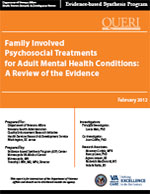
|
Principal Investigator:
Laura Meis, PhD Evidence-based Synthesis Program (ESP) Center Minneapolis VA Medical Center Minneapolis, MN; Department of Veterans Affairs; February 2012 |
Download PDF: Complete Report, Executive Summary, Report, Appendices
Since 2008, the President has signed two new laws expanding VA authority to provide family services for Veterans� mental health care and creating a need to identify efficacious and promising family involved interventions for improving Veterans� mental health outcomes. With one exception, prior reviews have traditionally focused on one condition at a time, limiting comparisons across conditions and preventing a synthesis of the evidence for all mental health conditions, including those with few randomized controlled trials (RCTs; e.g., Posttraumatic Stress Disorder or PTSD). Finally, prior reviews are potentially less relevant to VA populations due to their focus on studies conducted in non-Veteran populations.
Consistent with prior work defining empirically supported psychological treatments, we conducted a systematic review of the published evidence evaluating if (and which) family involved treatments improve patient outcomes (i.e., efficacy) and if (and which) family involved treatments are superior to alternative interventions (i.e., specificity or comparative effectiveness, especially those therapies that include solely the patient, not family members). This topic was nominated by Sonja Batten, PhD, Office of Mental Health Services, and is primarily intended to help refine clinical guidelines by providing information as to whether family treatments improve the outcomes for Veterans receiving care for mental health conditions and if they provide incremental benefits beyond treatment solely involving Veterans. To evaluate findings of greatest validity and relevance to the United States (and especially Veteran) populations, we included studies if they were RCTs conducted in the United States, and we focused on patient outcomes (i.e., final outcomes), including symptoms of mental health conditions and family/ couple functioning. Intermediate outcomes of interest included treatment adherence, treatment attendance, patient satisfaction, and social support for patients.
We addressed the following key questions: